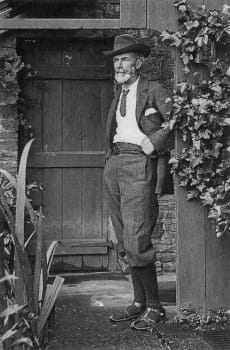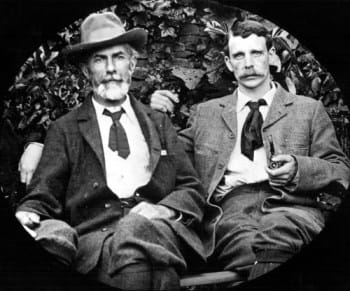Estimated reading time: 2 minutes

Image courtesy of National Portrait Gallery
Conway Hall’s library and archive collections bring together the words of many progressive individuals, but the phrase ‘a man ahead of his time’ has never been more fitting than when used to describe Edward Carpenter. The poet, writer and socialist promoted gay rights at a time when homosexuality was a criminal offence, advocated for recycling and ‘growing your own’ long before the green movement of the late-twentieth century, and spoke openly and positively about sexuality against a backdrop of Victorian and Edwardian sensibility. Dedicated to solving an impressive array of humanitarian issues, he was the model ‘millennial snowflake’.
Born into a middle-class family in Brighton, Carpenter (1844-1929) attended Trinity Hall, Cambridge University, before becoming a Church of England curate. During his time at university and in the clergy, Carpenter became interested in socialism, inspired by the poetry of Walt Whitman. In 1874, hoping to immerse himself in the lives of working people, he left his comfortable life in the clergy to lecture in northern towns. Finding that lecturing did not satisfy his desire to further the socialist cause, Carpenter became involved in radical politics and, in 1883, built a house in Millthorpe in rural Derbyshire that would become a sort of liberal, socialist Utopian retreat. At Millthorpe, Carpenter and his friends lived a simple and self-sufficient lifestyle, growing their own vegetables, hand-crafting sandals, writing, and promoting vegetarianism, nudity and sexual liberation. Perhaps most notably, he cohabited here in an openly gay relationship with his partner, George Merrill, at a time when homosexuality was a criminal offence. This was around the same time that Oscar Wilde was imprisoned for sodomy and gross indecency from 1895 to 1897. Carpenter is perhaps best immortalised in George Orwell’s thinly veiled reference to him in The Road to Wigan Pier as ‘the fruit-juice drinker, nudist, sandal wearer and sex maniac’.
All this controversial behaviour formed the basis of Carpenter’s progressive socialist politics. In 1883, he began attending meetings of the Social Democratic Federation, later leaving to join William Morris’ breakaway organisation, the Socialist League, and forming the Sheffield Socialist League. He was also a member of the Fabian Society, and his political writing inspired the co-founders of the Independent Labour Party. His humanitarian activism, as a member of the Humanitarian League, centred on issues such as anti-vivisection, prison reform, pacifism, animal rights and the abolition of capital punishment. Carpenter also supported the women’s suffrage movement and worked closely with the Women’s Freedom League.

Carpenter with his partner George Merrill. Image courtesy of Wikimedia.
Edward Carpenter’s most influential writing was on the topics of homosexuality, sexual liberation and socialism. In our collections, we hold Love’s Coming of Age – Carpenter’s Utopian vision of a future of gender equality, rational sex education, and recognition of a spectrum of sexual identities – and Intermediate Types Among Primitive Folk – a ground-breaking study of homosexuality with links to eastern religion and spirituality. Carpenter is thought to be the inspiration behind Havelock Ellis’ Sexual Inversion, the first significant study of homosexuality, which proposed the then unprecedented idea that homosexuality was innate and natural. Our collection also includes his autobiography and a biography, a book on prison reform, and some of his socialist pamphlets.
To read Edward Carpenter’s works, you can visit our Library Tue-Thu 10am-5pm. Our copies of Carpenter’s socialist pamphlets are currently being digitised as part of the Heritage Lottery funded project, Victorian Blogging.
